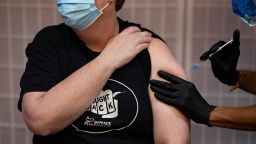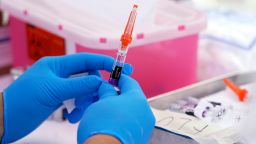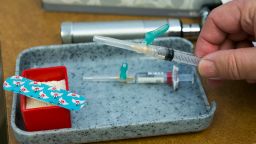Just when you thought it was safe for a holiday visit with your Auntie Mary and her fragile health, RSV and the flu reared their heads – and now Covid-19 numbers are creeping up again.
Health officials are emphasizing the availability of the protective measures, tests and treatments that they say will be key to preventing a repeat of the Covid-19 surges of the past two winters.
Case numbers are now below those of earlier waves, but about 14% of the US population is in an area that meets the US Centers for Disease Control and Prevention’s criteria for a “high” Covid-19 community level, up from less than 5% last week. New York City, Los Angeles County and Phoenix’s Maricopa County are among those areas.
Covid-19 hospitalizations have been on the rise since early November, and older people are bearing the brunt of these serious illnesses. Hospitalization rates are four times higher for seniors than for any other age group.
In the first week of December, the US had the most Covid-19-related deaths in months. Even with vaccines and treatments widely available, the CDC reported nearly 3,000 deaths for that week.
As it stands, there have been at least 99.2 million Covid-19 cases and more than 1.08 million deaths in the US, according to the CDC.
The White House said Thursday that this Covid-19 season does not have to be like last winter’s, when there was a large spike in cases with the rise of the Omicron coronavirus variant.
“We have the tools, we have the infrastructure, and we have the know-how to manage this moment,” White House Covid-19 response coordinator Dr. Ashish Jha said at a briefing.
The Biden administration has been in daily contact with state and local public health leaders, monitoring hospital levels, he said. And the federal government has medical personnel, supplies and other resources ready if states and communities need them.
The government is also reopening Covidtests.gov for a limited time so more Americans can get access to free tests. Each household in the US can order up to four at home tests that ship as early as next week.
Jha added that although “Covid isn’t the disruptive force it once was,” the country is prepared “no matter what the virus throws at us.”
Push for more vaccinations
However, more people still need to get boosted and vaccinated.
Only about 14% of eligible Americans have gotten an updated Covid-19 booster, and 1 in 5 people in the US remain completely unvaccinated, according to the CDC.
Survey data published Friday by the Kaiser Family Foundation found less than half of adults in the US are worried that Covid-19 cases and hospitalizations will increase this winter, and even fewer – only about a third – are worried that they will get seriously sick from the virus. These findings are based on KFF’s ongoing COVID-19 Vaccine Monitor project, and the latest survey was conducted from November 29 to December 8.
Only about 4 in 10 adults say they have gotten the updated booster or plan to do so as soon as possible, although federal data shows that the risk of Covid-19-related hospitalization is four times lower for adults who are up to date on their Covid-19 vaccines than for those who are unvaccinated.
Democrats are nearly four times more likely than Republicans to say they have gotten the updated booster shot or plan to. Among Republicans, skepticism is the driving factor. Even among those who have gotten their initial Covid-19 vaccine series, more than 60% said they “don’t think they need the new booster” or “don’t think the benefit is worth it.” Democrats were most likely to say they haven’t gotten the new booster because they are “too busy or have not had the time.” But even a quarter of Democrats surveyed say that they don’t think they need the new booster.
As at other times in the pandemic, groups who have been disproportionately affected by severe outcomes from Covid-19 – including seniors, as well as Black and Hispanic adults – were more likely than others to worry about rising cases and hospitalizations.
Public health officials have specifically stressed the importance of seniors being up to date on their vaccinations. Seniors were more likely than any other age group in the survey to say they have gotten the updated booster or plan to – the only age group with more than 50% expected uptake – but more than a third of seniors say they don’t think they need the new booster or don’t think the benefit is worth it.
Most parents in the survey do not plan to have their children get the updated Covid-19 booster shot. Only 30% of parents of children 5 to 11 and 42% of parents of adolescents 12 to 17 say they have gotten the booster or plan to do so.
About half of parents are worried that their child will get seriously ill from the flu, RSV or Covid-19 this season – but flu and RSV slightly outrank Covid-19.
Prevention and treatment
Jha said on CNN on Thursday that people who test positive for Covid-19 should “be evaluated for treatment,” especially those 50 and older and anyone with chronic conditions.
Treatments can reduce a person’s risk of being hospitalized or dying from Covid-19, but Paxlovid works best if started within days of when symptoms appear.
“We want to encourage people to use those tools, and given how widespread and how available those tools are, I think if people did that, we could get through” the Covid-19 season, Jha said.
Public health officials are beginning to recommend a return to one of those tools: masking in public places.
In Philadelphia, when schoolchildren come back from the winter break, they will be required to wear masks for 10 days as a “proactive measure” to reduce the spread of Covid-19 and other respiratory illnesses, a district spokesperson said.
Get CNN Health's weekly newsletter
Sign up here to get The Results Are In with Dr. Sanjay Gupta every Tuesday from the CNN Health team.
The CDC recommends masking for anyone who’s on public transportation. It also suggests wearing one in other public settings in communities with high Covid-19 community levels. People who are at high risk of severe illness are urged to wear masks even in areas with only medium community levels.
Other basic prevention measures still apply: Keep hands clean, and if you’re sick, stay home and do a video call with your elderly relatives.
CNN’s Deidre McPhillips and Tavleen Tarrant contributed to this report.





